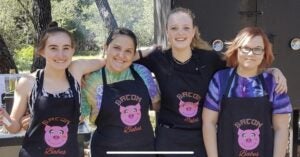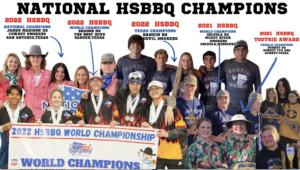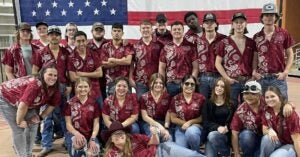High school is full of extra-curricular activities for students to pursue, but one school program that’s rapidly growing in popularity combines some national favorites: Agriculture, meat science, cooking, and even welding through barbecue.
“Barbecue touches every small town in America because people cook outdoors on live fires, hunt, fish, and grow up with that lifestyle,” said Chef Mike Erickson, director of the National High School BBQ Association. “Barbecue lets kids learn by doing, and we can use it to help promote agriculture on a whole other level and reach communities and schools in urban America, too.”
The National High School BBQ Association is a rapidly growing competition for high school and junior high students that doesn’t require popularity, athletic skill, or academic skill. It’s a team sport open to teams formed by students with teachers advising around live fire and experiential, project-based learning that ends in “project baste BBQ.”

Erickson is fondly known as the BBQ Principal. His love for BBQ and agriculture, however, didn’t start with a smoker. The BBQ Principal says that he got his start in culinary school thanks to a young lady he followed to the northeastern United States and then the Culinary Institution of America in New York.
“I was like a kid in a candy store, and it’s the best culinary school in the world, and it’s gotten even better since then,” Erickson reminisced. The relationship ultimately didn’t work out, but he finished culinary school and met a master chef who now works for Cargill.
From there, Erickson said that there were a lot of different things that led him down the path to becoming the BBQ Principal.
Ranches ignited an interest in connecting cooking to agriculture
“Kansas kind of started the whole thing,” he explained. “I’ve always been inspired by Kansas farmers and ranchers, the beef innovation center, and Gardiner Angus Ranch. I took my experiences back to Texas and worked through some of what I learned with my students.”
That experience turned into the TRUE BEEF From Pasture to Plate movie, a documentary following Texas high school students from Connally High School Culinary Arts around the Texas beef industry to ranches such as the R.A. Brown Ranch and Dudley Brothers Herefords, working alongside Aaron Franklin, owner of award-winning Franklin Barbecue.
“I was always around the beef industry and, of course, the meat industry, but then, my daughter became FFA president,” said Erickson. “The ag mechanics shop was right across the hallway from my classroom, and they were making massive, Texas-style 500-gallon tank barbecue pits.”
While the ag mechanics class made pits, they weren’t cooking on them. So, Erickson approached the ag teacher, Brandon Evans, and told him they needed to start a barbecue contest.
The first event in 2016 was a success. With an older tractor that the ag mechanics class had turned into a barbecue smoker, the fundraiser/contest kept growing every year.
“At year three, it grew across the state,” Erickson said. “It was taking off because of the interest in FFA and ag mechanics and relationships in the culinary world in the beef side. I’m a classically trained chef, but eight years ago, I knew nothing about competition BBQ.”
BBQ contests keep growing, but teaching kids is always at the center
Now, the National High School BBQ Association has competitive teams in five states, with hundreds of teams competing each year in the state of Texas. New Mexico, Arkansas, Kentucky, Virginia, and Utah are also looking to join the association. Each year, a national contest is held in one of the competing states. For 2024, the national contest will be held in Branson, Missouri.

“As a teacher, my job is to engage kids. A byproduct of that is that I get to cook a lot of good meat and help schools raise money. And now, it’s turned into a national contest,” said Erickson.
“Our BBQ curriculum was written by BBQ pit masters, chefs, and high school educators to meet state and national standards,” he added. “This enabled us to speak the language of educators who are intent on teaching core content throughout the school day. Our lessons are designed to be incorporated into many different content areas, career pathways, and align well with many Career and Technical Student Organizations.”
Traditional contests have three types of meat; most BBQ rodeos in America will do whole hog, pork, and ribs. But Erickson explained that his first and most important goal with the high school competitions is education.
Each time, five students compete in a barbecue cook-off that includes preparing five different food items: Ribs, chicken, steak, and desserts. Prizes include scholarships, buckles, bragging rights, and more.
“It’s not about BBQ for us; it’s about education. It’s about getting kids to learn. It’s about teaching them cooking techniques. It’s about teaching them how to weld and build BBQ pits. It’s about teaching them how to raise the animals and how livestock makes its way down the supply chain,” says Erickson.
The contests offer opportunities for scholarships and fundraising
The barbecue contests are opening up doors for more than just the BBQ world. Barbecue contests and fundraisers have helped with disaster relief, community service events, campus fundraisers, and fundraisers for other non-profit services, and school events.
Erickson said that one of his teams competed in a culinary competition for NASA, where the contestants were assigned the challenge of designing a recipe for astronauts in space. Five of Erickson’s students who competed in the contest went to college tuition-free.
Recently, one of the barbecue contests was held as a fundraiser for an FFA student whose mom had cancer.
“Half of the boys in the FFA chapter had shaved their heads. They wore pink shirts for ‘Team Cassandra’ to help raise money for her. Her son won grand champion chicken that day, and there wasn’t a dry eye in the house,” Erickson said. “People think I’m crazy, but God has a plan and a purpose. And I’m just going to keep following the path that he’s leading me down.”

Heidi Crnkovic, is the Associate Editor for AGDAILY. She is a New Mexico native with deep-seated roots in the Southwest and a passion for all things agriculture.



